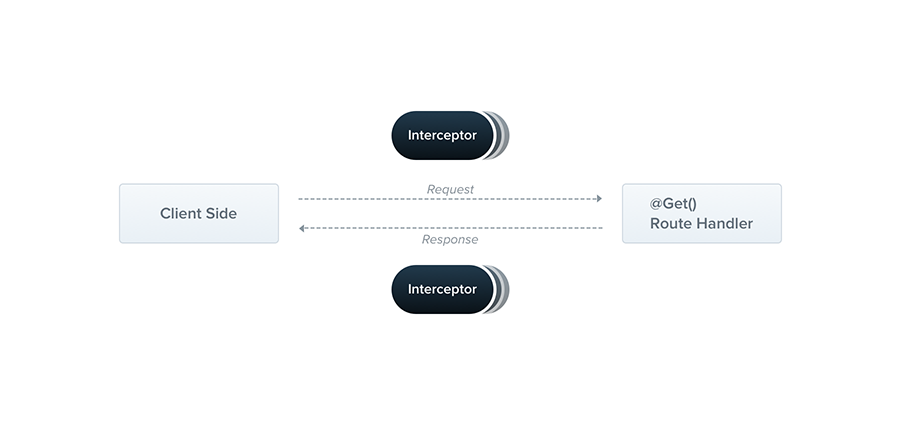NestJS 拦截器
拦截器(interceptor)
官方文档介绍:
拦截器是一个实现了
NestInterceptor接口并使用@Injectable()装饰器注解的类。
 每一个拦截器都实现了
每一个拦截器都实现了 intercept 方法,和 Koa 的中间件模型很相似,intercept 方法接收两个参数,第一个参数是执行上下文,第二个参数是一个 CallHandler,调用 CallHandler 的 handle 方法开始执行下一步处理逻辑,最终调用 Controller 中的路由方法。
拦截器主要有这几个作用:
- 在路由方法执行的前后处理额外的逻辑
- 转换从路由方法返回的结果
- 转换从路由方法抛出的异常
- 扩展路由方法的行为
- 完全重写路由函数
修改 Response
借助拦截器,可以轻松修改 Response,比如把 bigint 类型转换为 string ,去掉 user 的 password 属性,将自增的 id 重新编码等。同样的,也可以自定义一个 RestfulInterceptor 轻松地将 Response 包装为统一的格式。
export interface RestfullResponse<T> {
data: T
code: number
message: string
}
@Injectable()
export class RestfulInterceptor<T> implements NestInterceptor<T, RestfullResponse<T>> {
intercept(
context: ExecutionContext,
next: CallHandler
): Observable<RestfullResponse<T>> {
return next
.handle()
.pipe(map((data) => ({ data, code: 0, message: 'success' })))
}
}
忽略拦截器
日常开发中,通常会把拦截器绑定到全局或者 Controller 上,这样不必为每一个路由方法都绑定一次拦截器,但是很多时候又想给单独在一个路由上取消绑定拦截器。幸运的是,NestJS 可以为路由自定义 metadata ,我们可以在拦截器中获取自定义的 metadata 来执行特定的逻辑。
新建一个 ignore-interceptor.decorator.ts 文件。
import { SetMetadata } from '@nestjs/common'
export const IGNORED_INTERCEPTORS = 'IGNORED_INTERCEPTORS'
export const IgnoreInterceptors = (...interceptors: string[]) =>
SetMetadata(IGNORED_INTERCEPTORS, interceptors)
然后在 Controller 中引入 IgnoreInterceptors 装饰器。
@Get()
@IgnoreInterceptors(HashidsInterceptor.name, RestfulInterceptor.name)
list() {
//...
}
在上面的 RestfulInterceptor 中继续修改,增加一个 shouldIgnore 方法,获取路由的 metadata,检查当前拦截器是否在 IGNORED_INTERCEPTORS 中,如果在,就不做任何额外处理。
@Injectable()
export class RestfulInterceptor<T> implements NestInterceptor<T, RestfullResponse<T>> {
constructor(readonly reflector: Reflector) {}
intercept(
context: ExecutionContext,
next: CallHandler
): Observable<RestfullResponse<T>> {
if (this.shouldIgnore(context, RestfulInterceptor.name)) {
return next.handle()
}
return next
.handle()
.pipe(map((data) => ({ data, code: 0, message: 'success' })))
}
shouldIgnore(context: ExecutionContext, name: string): boolean {
const interceptors = this.reflector.getAllAndOverride<string[]>(
IGNORED_INTERCEPTORS,
[context.getHandler(), context.getClass()]
)
if (interceptors && interceptors.length > 0) {
return interceptors.includes(name)
}
return false
}
}